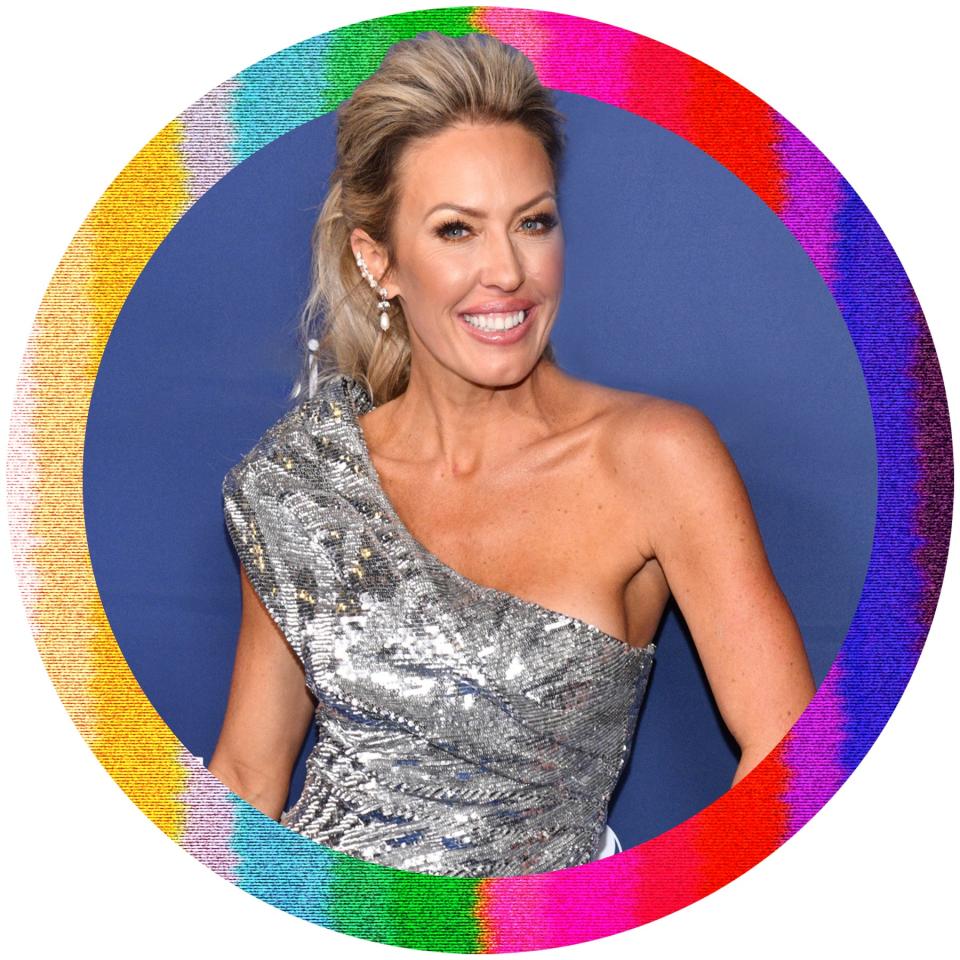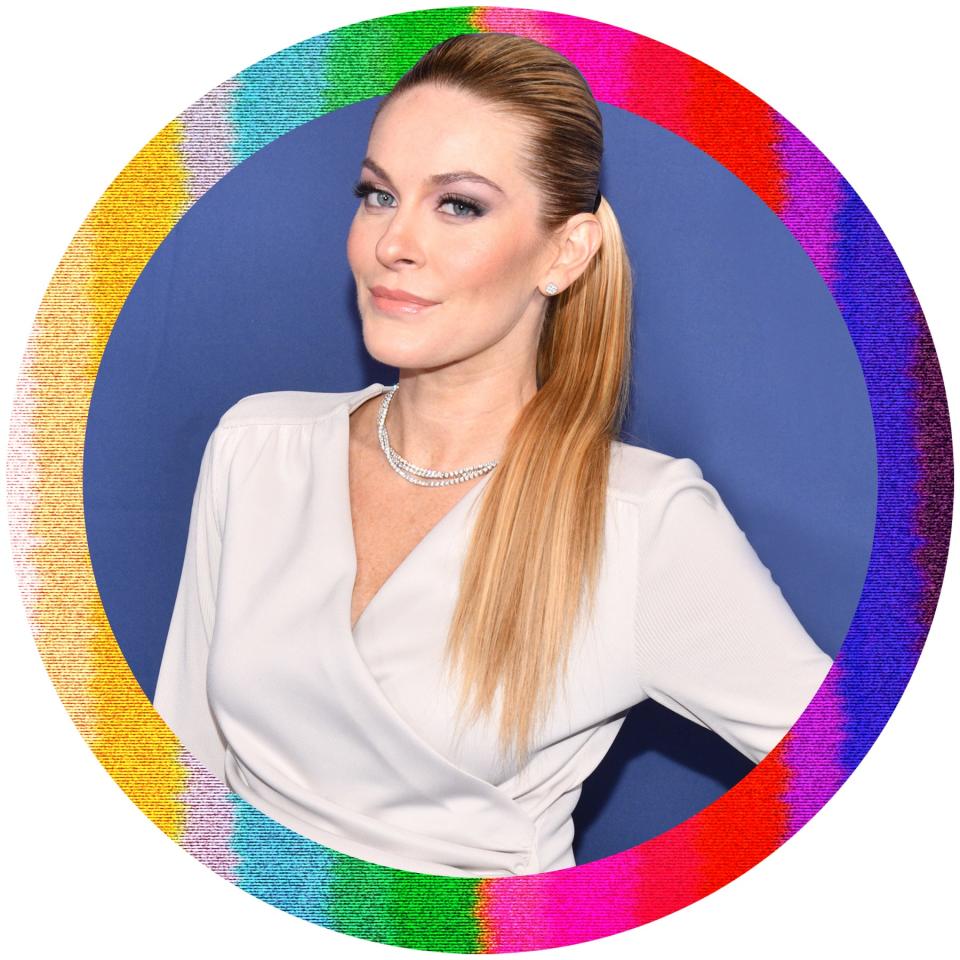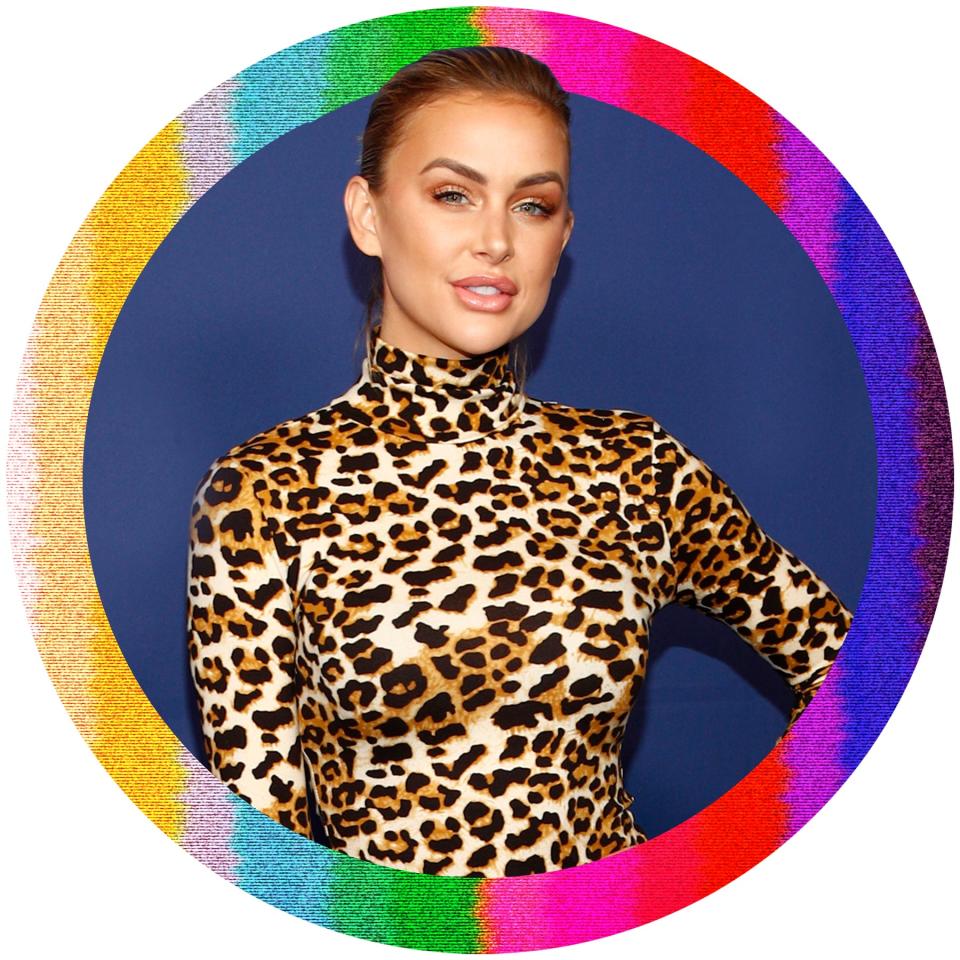Getting Sober on Bravo, as Told by Leah, Lala, and Braunwyn
In the final seconds of The Real Housewives of Orange County season 15 premiere, Braunwyn Windham-Burke comes to a conclusion: “I don’t know if it’s divine intervention,” she says in a testimonial, “but for the first time I can say, “Hi, my name is Braunwyn, and I’m an alcoholic.’”
Leading up to this powerful moment, we learn something is amiss with Windham-Burke—and that something has to do with alcohol: Throughout the episode, her drinking is a topic of conversation for RHOOC costars Emily Simpson, Kelly Dodd, and Gina Kirschenheiter as montages of Windham-Burke’s raucous nights out from the previous season, her first with the franchise, flash across the screen. By the time the premiere closes with a tearful heart-to-heart with Simpson, it’s clear Windham-Burke’s sobriety journey will make up much of her storyline this year.
“It’s super emotional and very raw and open,” Ryan Flynn, senior vice president of current production at Bravo, says of her reveal. “I think it will change what you might have thought of her in her first season.”
But sobriety is a fragile thing, especially when it’s so new. Did he, or Bravo, have any reservations about making this piece of Windham-Burke’s life public? “To me, the sense of freedom and honesty outweighs any downside,” says Flynn.
Plus, Windham-Burke isn’t the first Bravo reality TV star to reckon with her relationship to alcohol on camera in recent years. Lala Kent and James Kennedy from Vanderpump Rules have both been candid about attending Alcoholics Anonymous meetings; earlier this year Summer House star Carl Radke revealed he was taking time away from drinking after watching his alcohol consumption on the show; Luann de Lesseps and Leah McSweeney from The Real Housewives of New York City have discussed their on-and-off sobriety on camera; and Kim Richards’s struggle with alcoholism has been a major part of The Real Housewives of Beverly Hills for many seasons.
While discussions of sobriety and substance-use disorders are not new to reality TV on the whole—see Celebrity Rehab With Dr. Drew and its spinoff Sober House—it is rare to see each step play out on screen. We’re with these stars as they first arrive on screen, declaring themselves to be the life of the party. And then, however many seasons later, we watch as they realize they have a problem and take measures to deal with it. It can be a messy process—there are often setbacks, for example—but that feels more true to life.
There are reasons why others in their same position might choose to keep their recovery confidential. The anonymity part of AA isn’t just about protecting one’s own privacy—it’s also about protecting the program. “Say someone is public about being sober via AA and then slips publicly,” a longtime AA-goer who wishes to remain anonymous explains. “It can send a message to the struggling alcoholic that AA doesn’t work and keep them from getting help.”
On the other hand, being public about a struggle with substance use can help others. In Variety’s 2019 Recovery Issue, for example, Jamie Lee Curtis recalls reading Tom Chiarella’s 1999 Esquire piece “Vicodin, My Vicodin,” which detailed his addiction to painkillers. It inspired her to attend her first recovery meeting, and she’s been sober ever since. Looked at from this perspective, perhaps the hope is that the more addiction is out in the open, the less it's treated as a shameful secret. According to the 2018 National Survey on Drug Use and Health, 14.4 million adults ages 18 and older have an alcohol use disorder, but only 7.% of them received treatment.
Below, we talk to Windham-Burke, McSweeney, and Kent to understand, in their own words, what navigating their sobriety on television has been like.

Braunwyn Windham-Burke, The Real Housewives of Orange County
If you look at the footage of the premiere, you can see my hands shaking because I knew if I said, “I’m an alcoholic,” I couldn’t take it back.
When I first got sober, I was scared I wouldn’t be fun anymore, that my life was going to be boring. I really thought alcohol made life enjoyable, and that’s sad. Now, nine months later, I realize that’s not at all true. Honestly, I dance even more now because I can stay awake. I sometimes used to pass out at, like, 7 p.m. because I had been drinking all day. So yeah, I actually have way more fun now.
I’ve never had a healthy relationship with alcohol, from the first sip I took at 14. When I drank, I drank until I blacked out or got sick. But I never drank when I was pregnant or nursing—and in many ways, I think that probably saved my life. I went to a meeting when I lived in Miami, but instead of sticking to a program, I just got pregnant. I have seven kids, so that’s a huge chunk of my life that I was sober—or I should say, not drinking. Now I realize there’s a difference between not drinking and being sober, for me.
When I say I’m getting sober, I mean that I’m taking the time to be still and think about why I drank so much. For me, it’s insecurity, it’s anxiety, it’s that I’m uncomfortable in my skin. I’m working on understanding why I have those feelings and finding a healthy way to deal with them.
Right before Real Housewives started filming last season, I had weaned my daughter Hazel and thought, You know what? I haven't drunk in seven years. I’m fine. If I was an alcoholic, I couldn’t have done that.
That wasn't the case. When I would watch the show, there were some scenes I had no recollection of, like my weaning party. Becca [a Bravo public relations executive] had to babysit me at BravoCon last year, taking tequila out of my hands. That wasn’t fair. I was putting the crew that I worked with and my family in really uncomfortable positions, and it got unmanageable quickly.
On January 30 this year, I was in Miami. Kelly Dodd was hosting a birthday party for her fiancé, and I was drinking around the clock. I was hiding alcohol bottles in my closet; I couldn’t go more than half an hour without a drink because I started shaking. I woke my husband up and said, “I can’t stop. I need you to sit on me. That’s how bad it’s gotten.” It was ugly. I had the tremors, I was seeing spots when I closed my eyes. It was a nightmare.
I’m friendly with [Below Deck star] Captain Sandy’s girlfriend, Leah. I knew Captain Sandy was sober for, like, 30 years, so I called Leah and asked if I could speak with Captain Sandy. We talked for an hour, during which time I told her what I was dealing with and asked if I could do this [sobriety journey] on film. She said, “Absolutely, but you need to own it on the show. You need to be accountable, otherwise you’re going to drink again.” Before I could change my mind, I called my producer and said, “This is the truth: I’m an alcoholic. I have been for many years, and I need to get sober. Let’s tell this story.” Five days later, we started filming.
I don’t think I fully realized the journey I was about to embark on. There’s a scene this season, when I was 30 days sober and spiraling. I hadn’t gone to an AA meeting yet—I was still trying to do it on my own—and I was not okay. I stormed out, threw my microphone off, and said, basically, “Fuck off. Get out of my house.”
The producer came in, put the camera down, and said, “Look, we’re not leaving. You can do whatever you want to do, but we’re going to film it.” I was planning on going out and drinking, but I realized that if I did, then I was going to have to do it in front of all these people I care about. Instead I went to what ended up being my first AA meeting.
Maybe I’m going to screw this up. Maybe by talking about it publicly, I’m setting myself up. I don’t have all the answers, but I do feel that telling my story as honestly as possible is the right choice.
And I love AA. I love that it is a safe, supportive environment where people can share how they feel without judgment. I never knew the lightness that could come from that. I’m very proud of those chips I earned.

Leah McSweeney, The Real Housewives of New York City
I’ve been going to clubs since I was 13, so that’s where I felt at home. It was very normal for me to be coming home at 7 a.m. I had my daughter Kiki very young, at 25, but I still wasn’t ready to settle down. [Her father] Rob was very upset. He was like, “What are you doing? You’re coming home wasted. This isn’t cool.” And I said, “Okay, we need to break up because you’re getting in my way.”
Once we split up and I had half the time to myself, I spiraled out. I was drinking to the point of blacking out all the time, and there was no controlling it. I was trying to. That’s the scary part, when you’re like, “I’m only going to have a glass of wine tonight. I’m going to just wear my Uggs out because I’m not going anywhere.” And then you end up at [New York City club] The Box until five in the morning.
I stopped drinking in November 2009, when Kiki was two. If I had been drinking all those years, I wouldn’t have a daughter that is as grounded, happy, and close to me as she is now.
The timing of my first season of RHONY was so bizarre because after those 10 years of sobriety, I started drinking again six months before filming. At one point, before we started the show, I thought, I should probably stop again because the last thing I need to be doing is getting drunk on TV. But I wasn’t ready to stop yet.
Watching the show was really interesting because I didn’t realize how much I carry around the teenage Leah with me. There were times when I was acting out, and I thought, Oh, my God, Leah! You’re an adult now—you have a child, you’re a mom, you’re a businesswoman. But I have imposter syndrome and tell myself, No, you're just a fucking delinquent, and this is just all happened by accident; you’re lucky you have it because it’s just going to be taken away from you one day. That’s alcoholic thinking, so I’m working on that now.
Honestly, I don’t regret any of it. Luckily nothing terrible happened, and I think Hurricane Leah was brilliant. You’re seeing a raw, emotional, drunk side of me, which is part of me.
But the way that some people spoke of my drinking on the show was so vile. I got so many comments: “She’s a drunk! Look at the way she acts! Her daughter must be ashamed!” It really made me realize how weirdly we treat addiction and alcoholism issues. They would never say that to a man, ever. If a man who had once been sober got on TV, got wasted, and acted ridiculous, I bet you we would not see one thing about it on their Instagram feed. People cannot stand an unapologetic woman.
Anyway, getting sober this time around was much different because I had that whole 9 to 10 years of work I’d done on myself. This time I was much more like, Something bad is going to happen if I continue; things are not going the way I want them to. It wasn’t easy the first couple months at all. I missed wine. But now I don’t have any interest in it.
Look, I’m sure it helps knowing that the stakes are high. I’m a public figure now. That’s bizarre! I can’t get blackout drunk and act a fool without getting written up in Page Six. That’s not what I want my legacy to be at all. I don’t want to have a disaster story that ends in an explosive car crash. I want my life to be a great story. Some of that’s out of my control, but some of it is, like not drinking.
I’m not a poster girl for sobriety. I don’t have any answers. I only have my own experience. I’m just here, doing me, and I happen to be on TV doing it.

Lala Kent, Vanderpump Rules
I had tried to stop drinking many times. Once I finally came to the conclusion that I can’t do this by myself, and that alcohol is more powerful than me, I knew I needed to go to AA. When I arrived I found a group of people who came from similar backgrounds as me, and I realized that alcoholism and addiction do not discriminate. For me, it’s important to talk about AA saving my life because I was one of those people who looked at the meetings and thought, That looks like torture. Once I went and was willing to put in the work, I benefitted extremely from the program.
I’ve had old-timers come up to me and say they’ve read articles about me talking about AA and aren’t too happy about it. And I politely say, “My generation is struggling. I have to be a voice. I have to let them know this program is saving my life, and it could potentially save theirs.”
My generation doesn’t know how to have a good time unless they’re tripping on something. We’re living on Instagram. Nothing made me want to drink more than when I was looking at Instagram Stories, feeling like I had to keep up, or watching television where all these people were, like, drunk on yachts. That kind of life is a high you can’t reach, and it’s not real, but it adds to anxiety and depression. And what do people turn to when they’re stressed and having anxiety and depression? They turn to substances.
Up until season eight of Vanderpump Rules, I had never filmed sober. That was my life: I would wake up and go to brunch or whatever it may be. Alcohol was an everyday, any time of day, thing for me.
And I’m in good company when I’m drunk! You know, a lot of the people on our network are drinking heavily. I’m not saying that any of those people have a problem in any way, but when you’re at a party and getting drunk and everyone else is getting drunk because it’s a Friday night…you look at yourself and think, Oh, well, that person was way drunker than me. Or, Oh, we had the best time; we were just both drunk together.
No one saw what it was like when I laid my head down on the pillow and woke up the next morning and thought, I could totally be done with this life. I was so deep in a drunken, depressed stupor. Unless you’ve been there, unless you’ve felt the heaviness of being in a hole all day, it doesn’t make much sense, but that was a regular occurrence for me. And how do you cure that? You start drinking again. It was bad.
One day, six months from the day my dad died, I opened my eyes and said, “You’re an alcoholic, and you’re getting help today.” In that moment it felt like, “I get to choose how I’m going to live, and it’s not going to be like this. I will never have another morning like this.” And I haven’t. It’s been fucking awesome. Identifying as an alcoholic is the most powerful I’ve ever felt in my whole life.
I’m not saying I don’t battle anxiety and depression still, but I have a clear frame of mind. There are many days where I think, Do I want to do this forever? When I turn 60, can I have a glass of wine? That’s when I call my sponsor, who is on speed dial, and I go through my phone and look at images of myself when I was drinking.
My eyes are glazed over. These are photos where I thought I looked awesome and sexy and posted them, or I look at videos and see that this person is gone. She’s vacant. It’s enough to make me never want to drink again.
These interviews have been edited and condensed for clarity.
Julia Bainbridge is a writer and the creator of The Lonely Hour podcast. Her new book, Good Drinks, is available now.
Originally Appeared on Glamour

